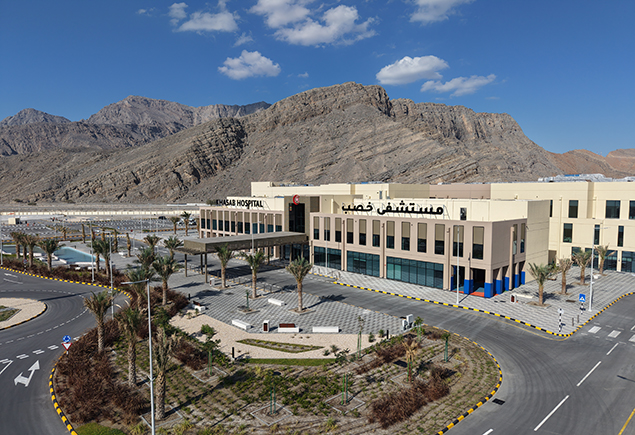In an effort to strengthen the healthcare system in the Sultanate of Oman and achieve Oman Vision 2040, the Ministry of Health launched today (Wednesday) the Oman National Health Policy at Al Bustan Palace Hotel.
The launching ceremony was held under the auspices of His Excellency Sayyid Dr. Sultan bin Ya'arub Al Busaidi, Advisor at the Private Office, with the presence of H.E. Dr. Hilal Ali Al-Sabti, Minister of Health, and number of Their Highnesses and Excellencies, alongside several officials from the health sector in Oman and representatives from health-related international organizations.
The launch program featured a speech by H.E. Dr. Ahmed Salem Al-Mandhari, MOH’s Undersecretary for Health Planning and Regulation, who emphasized that this achievement would not have been possible without the tireless efforts and fruitful collaboration across various sectors and partners. He explained that the policy was developed in a participatory manner, ensuring its alignment with Oman Vision 2040 and its responsiveness to global health developments, making it the cornerstone for a more efficient, equitable, and sustainable healthcare system.
Dr. Al-Mandhari highlighted that the policy is grounded in the principle of "Health for All, by All," which reflects a shared vision where health is a collective responsibility that requires the joint efforts of all sectors and partners.
He added that it is well-known that individual and community health is influenced by several factors beyond the traditional healthcare sector, such as education, housing, income levels, working conditions, environmental, and economic factors. This is why the Health in All Policies (HiAP) approach has been adopted, emphasizing the importance of cooperation and integration between government and non-government sectors, stakeholders, and the community to maximize health benefits and minimize the negative impact of public policies on individual health.
His Excellency outlined that the goals of (HiAP) approach include improving the health of populations, promoting health equity, ensuring the integration of health considerations into government policy-making, and supporting the sustainability of decisions that prioritize public health while preventing potential health harms.
He also presented detailed efforts across sectors aimed at improving health, such as the National Committee for Prevention & Control of Non-Communicable Diseases, the National Tobacco Control Committee, the National School Health Committee, community initiatives, and Oman’s hosting of the Third Global High-Level Ministerial Conference on Antimicrobial Resistance.
In closing, Dr. Al-Mandhari addressed the challenges faced by the "Health in All Policies" approach and discussed solutions to overcome these challenges.
For her part, Dr. Hana Balkhy, Regional Director of WHO for the Eastern Mediterranean Region, emphasized in her speech on behalf of the Organization that Oman National Health Policy aligns with WHO’s Fourteenth General Programme of Work, the Strategic Operational Plan for the Eastern Mediterranean Region 2025-2028, and the WHO’s three regional flagship initiatives on expanding access to medicines, building up the health workforce, and tackling substance use.
Dr. Balkhy also pointed out that one of the strengths of this NHP is its recognition that a population’s health and well-being is a responsibility shared by all.
In his presentation on the National Health Policy and areas of collaboration with various sectors, Dr. Qasim Al-Salmi, MOH’s Director General of Planning highlighted the key reasons for updating the national health policy, pointing out that the current health policy dates back to 1992. Dr. Al-Salmi provided an overview of the policy's main features, its foundational principles, and the enablers that align with Oman Vision 2040. He emphasized the growing role of government sectors, the private sector, and the community in achieving the policy's goals. The Director General of Planning concluded his presentation by outlining the future steps and directions that will help turn the policy into reality.
The National Health Policy represents a pivotal advancement in the development of Oman's healthcare system and serves as a fundamental update to previous policies. It is fully aligned with Oman Vision 2040, prioritizing sustainability, governance, and the strengthening of cross-sector partnerships. The policy introduces a comprehensive healthcare model that not only addresses demographic and epidemiological shifts but also emphasizes sustainable health financing and the integration of digital technologies to improve service delivery.
This policy is designed to tackle the key challenges currently facing the healthcare sector, including the rise in non-communicable diseases, the growing elderly population, and ensuring the long-term sustainability of health financing. Central to its approach is the enhancement of healthcare service quality, the promotion of decentralization, and the refinement of governance frameworks to ensure more efficient and equitable management of healthcare resources.
The launching event was accompanied by a panel discussion featuring prominent speakers, including H.E. Dr. Ahmed Al-Mandhari, MOH’s Undersecretary for Health Planning and Regulation, H.E. Dr. Saeed Al-Lamki, MOH’s Undersecretary for Health Affairs, and Dr. Hanan Balkhy, WHO-EMR Regional Director. The session was moderated by Dr. Yusuf Al-Farsi, Director General of Health Services in Muscat Governorate.
The discussion focused on three key topics: achieving health and well-being in a rapidly changing and complex global system, addressing the root causes of health determinants and diseases, and strengthening the concept of "Health in All Policies." Additionally, it explored ways to enhance primary healthcare and strengthen the health system's capacity to achieve universal health coverage. The session was attended by directors general and department directors from the Ministry, as well as directors general of health services from various governorates as well directors of planning departments.
It is important to note that national policies serve as the framework that defines strategic directions for developing the healthcare system. They are pivotal in identifying health priorities and guiding resource allocation, thereby improving the quality of healthcare services and ensuring the financial sustainability of the system. National health policies are key in ensuring equitable access to healthcare services, whether in urban or rural areas, and are instrumental in fostering collaboration across different sectors to ensure the delivery of exceptional healthcare services to all.









